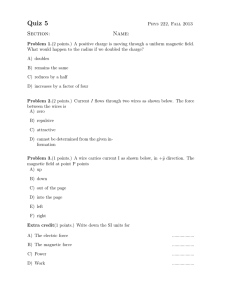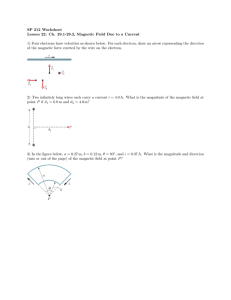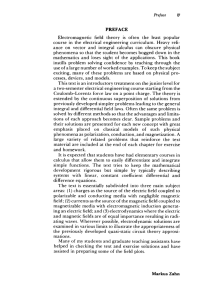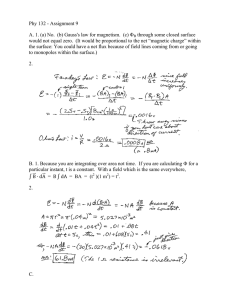MIT OpenCourseWare 6.641 Electromagnetic Fields, Forces, and Motion, Spring 2005
advertisement
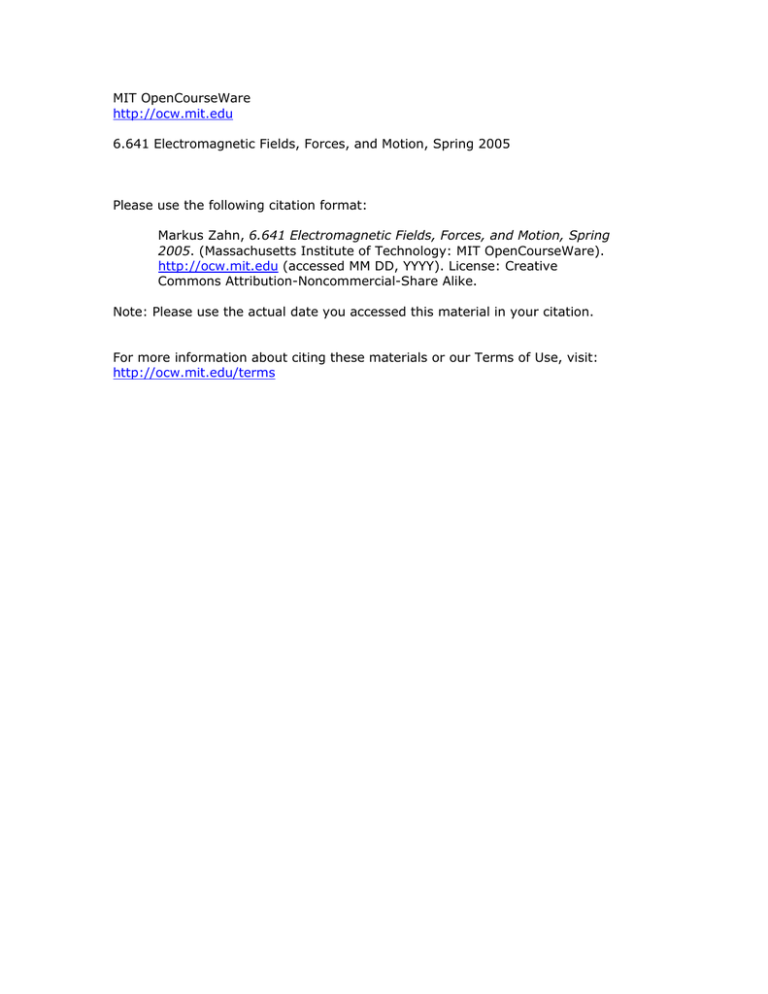
MIT OpenCourseWare http://ocw.mit.edu 6.641 Electromagnetic Fields, Forces, and Motion, Spring 2005 Please use the following citation format: Markus Zahn, 6.641 Electromagnetic Fields, Forces, and Motion, Spring 2005. (Massachusetts Institute of Technology: MIT OpenCourseWare). http://ocw.mit.edu (accessed MM DD, YYYY). License: Creative Commons Attribution-Noncommercial-Share Alike. Note: Please use the actual date you accessed this material in your citation. For more information about citing these materials or our Terms of Use, visit: http://ocw.mit.edu/terms Massachusetts Institute of Technology Department of Electrical Engineering and Computer Science 6.641 Electromagnetic Fields, Forces, and Motion Quiz 2 April 20, 2005 You are allowed to use a one page (both sides) formula sheet that you have prepared for Quiz 2. In addition, the 6.641 Formula Sheet is attached in the study materials section. y 1. (35 points) K K 0 cos Ztiz Superconductor H 0 , P0 , Z p P of z V of d x A surface current of infinite extent in the y and z directions, K ( x 0, t ) K 0 cos Ztiz , is located in the x = 0 plane between a region with infinite magnetic permeability, P o f for x<0, and a superconductor in the region 0 < x < d described by plasma radian frequency Z p , dielectric permittivity H 0 , and magnetic permeability P0 . The region for x > d is a perfect conductor with V o f . In the superconducting region, 0 < x < d, the volume free current density J is related to the electric field E as wJ wt Z p2H 0 E and the magnetic field H obeys the equation 2 H Z p2H 0 P0 H 0 Because the system is uniform and of infinite extent in the y and z directions, all fields only depend on the x coordinate. (a) What is the direction of H for 0 < x < d and what is H for x < 0 and x > d ? (b) What boundary conditions must H satisfy at x = 0 and x = d ? (c) What are the directions of J and E in the region 0 < x < d ? What boundary condition must E satisfy at x = d ? (d) What is the general form of solution of H , J , and E for 0 < x < d ? (e) Apply the boundary conditions of (b) and (c) and solve for H , J , and E . (f) What is the surface current K ( x d , t ) on the x = d plane? (g) What is the force per unit area on the x = d plane? 1 2. (30 points) z T y I R P0 M M 0 iz x M 0 ª¬ ir cos T iT sin T º¼ A permanently magnetized medium of infinite extent in all directions has magnetization: M M 0 iz M 0 ª¬ ir cos T iT sin T º¼ The medium has zero conductivity so that the free volume current density, J , is zero everywhere. The medium has a spherical hole of radius R filled with free space with magnetic permeability P0 . The magnetic field H as radius r from the center of the spherical hole goes to infinity is zero, H (r o f) 0 . The field solutions are axisymmetric so that there is no variation with the azimuthal angle I . (a) Because J 0 , the magnetic field H has zero curl. This allows the definition of a magnetic scalar potential F (r ,T ) where H F . What are the governing equations for F in the regions r R and r ! R ? (b) What boundary conditions must be satisfied at r = R? (c) Solve for the magnetic scalar potential F (r , T ) and magnetic field H (r , T ) in regions r R and r ! R . (d) For r ! R , what is the effective magnetic dipole moment of the spherical hole? Hint: The magnetic scalar potential for a point magnetic dipole with moment m directed m cos T . in the z direction is F (r ,T ) 4S r 2 2 3. (35 points) Pof g i + P l + I0 O v x - D w N turns The figure illustrates a magnetic yoke with infinite permeability; and an air gap with magnetic permeability P0 , length g, and cross-sectional area Dw . An incompressible block with length l !! D , magnetic permeability P and cross-sectional area wg can move in the x direction as shown. Both the magnetic block and the yoke can be assumed to have negligible electrical conductivity. There is an N turn winding around the magnetic yoke driven by a DC current source I0. Assume throughout that the position x of the moveable block is bounded as 0 d x d D . (a) Find the flux linkage (O) – current (i) relationship for the winding in terms of x, P, P0 , N and the dimensions of the magnetic circuit. (b) Find the force in the x direction on the incompressible block due to the current source I0. (c) If the magnetic block is forced to move with a displacement given by x x0 xc cos(Zt ) find the voltage developed across the current source. (d) The current source and the block position are controlled to traverse the i – x plane in a cycle as shown. Find the work done by the current source for each cycle. I I2 I1 x1 x2 x 3
